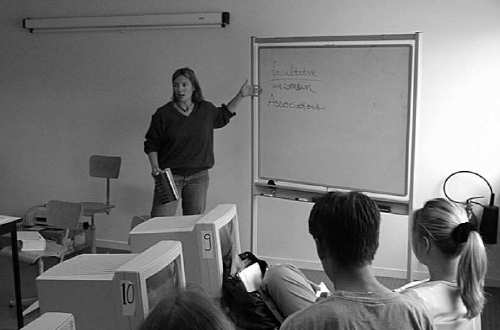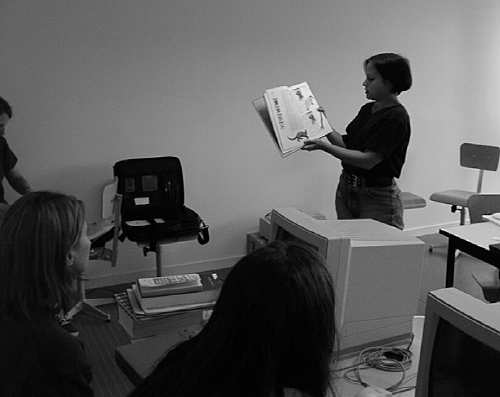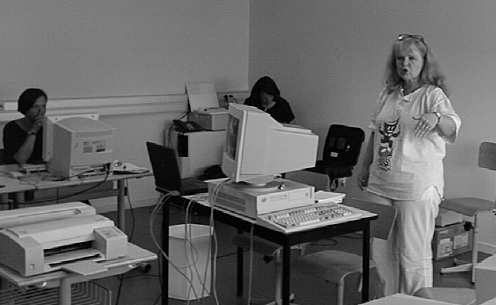
West Virginia University in Vendée, France

After a much needed day of rest and recuperation yesterday, the WVU-Vendéens gathered today for a very enriching session in class. The meeting would include a review of the images and notes we captured during our trip to the Valley of the Kings, but most importantly we began today the oral reports on the individual culture and communication projects that each student has conducted during our stay.
Note: Due to an excessive amount of sunlight flowing into a white classroom, the colors are flooded out from the pictures below. Please forgive the photographer whose talents fall far short of those that will be on display during our visit tomorrow to the Futuroscope, the European Park of the Image....
Below, Kate Wright delivers a fascinating report on the system of social
support available to the citizens of France. Among the basic concepts Kate shares is
the distinction between "social protection", available to all citizens of the
Republic no matter what their income (child allocations, educational stipends, health
care) and "social assistance", designed for citizens in special need (orphans,
handicapped, the aged, the unemployed). Kate skillfully outlined the advantages and
disadvantages of the French national system compared the so-called American welfare
arrangement. Her ideal would be an approach that combined the best in each and
eliminated the worst in both. Many of would have voted for the "Wright Way"
toward social reform!!!

Jennifer Campbell's report focused on the ecology of Vendée. She opened with a geographical description of the Atlantic coast ("le littoral"), the interior forests and fields ("le bocage") and the intermediary wetlands ("le marais breton" in the north and "le marais poitevin" in the south). Among other things, Jennifer pointed out that industrial development in Vendée is relatively small but the department is the second in France in tourism. That tourism is largely dependant on the natural beauty of an area that it also threatens through the development necessary to support it -- very much like our own West Virginia, n'est-ce pas?

Marjorie Martorella chose to focus on two questions very close to her heart.
First she spoke of he interview with M. Rousset, Procureur de la République and the
insights he shared with her on the French judiciary system. Like many in the
American criminal justice system, M. Rousset believes that trials in France take too long
and that French prisons are too small. Marjorie then proceeded to a report on her
recent weekend trip to the beaches of Normandy, where both her father and uncle landed in
June of 1944. She spoke of her visits to Utah Beach and to Sainte-Mère Église, the
latter being where Marjorie's father had and his unit of paratroupers jumped in support of
the critical Allied landing. Tears filled the room when Marjorie recounted that only
her father had survived this invasion, her uncle dying with the thousands who gave their
lives to deliver France and Europe from the grip of Hitler's armies.

Tomorrow, WVU-Vendée takes off from our visits to the pages of the past toward
a new time and the new vision of the Futuroscope.
Stay tuned to WVU-V!
Go on to July 3, 1998.